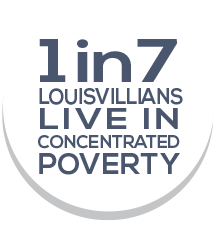Louisville
A Focus on Poverty

The Greater Louisville Project’s 2015 Competitive City Update, “Louisville: A Focus on Poverty,” examines poverty beyond income both within Louisville and in comparison to its peer cities. The report also explores the connections between poverty and Louisville’s Deep Drivers of Change: Education, 21st Century Jobs, Quality of Place, and Health. The report draws a clear connection between levels of concentrated poverty and the city’s overall competitiveness.
For the first time in this report, the GLP assesses Louisville by neighborhood, using census data combined with a multidimensional poverty index developed by the Brookings Institution. Brookings’ analysis indicates that the effects of multidimensional poverty on a resident do not just add up – they compound the barriers to each citizen’s success and wellbeing.
Louisville ranks 15th out of its 17 peer cities in concentrated poverty, with 1 in 7 Louisvillians living in a multidimensionally poor area. In comparison to peer cities such as Nashville, St. Louis, and Cincinnati Louisville is lagging behind, making it harder for individuals and the city itself to succeed.
The effects of multidimensional poverty on a resident do not just add up – they compound the barriers to each citizen’s success and wellbeing. Louisville ranks 15th out of 17 among our peer cities, with 1 in 7 Louisvillians living in concentrated poverty.
Concentrated poverty is defined as a census tract that is far below the citywide average across income, jobs, education, and health. A census tract in concentrated poverty is one that is in aggregate at least 1 standard deviation worse off than the citywide average in terms of all four MPI indicators highlighted in this report.

Acknowledgements
The Greater Louisville Project is organized by The Community Foundation of Louisville and supported by a consortium of philanthropic foundations including The James Graham Brown Foundation, Brown-Forman, The C.E. & S. Foundation, Gheens Foundation, The Humana Foundation, The JP Morgan Chase Foundation, Jewish Heritage Fund for Excellence, Lift-A-Life Foundation, Owsley Brown II Family Funds, and the Stephen Reily and Emily Bingham Fund.
You can view the report appendix here.
To request copies of the report email glp@greaterlouisvilleproject.org.
For each indicator, Greater Louisville Project assigns cities into one of three groups (high-performing, middle-of-the-pack, and low-performing) based on how they compare to other cities. The assignment is based on how cities naturally cluster on that indicator. Sometimes, the differences between cities are very small, and the difference between a city ranked 5th and 6th could simply be a matter of the sampling error that arises from using survey data. Thus, rather than always make a division that declares the top 5 to be the top tier, we use a natural breaks algorithm to look for a cluster of cities that is outperforming the rest, a cluster that is about average, and a cluster that is lagging. This clustering gives us a better indication of where Louisville is thriving and where Louisville has room to learn from cities that are doing better.
Z-scores (or standardization) is a way to combine data with different units of measurement into a single index. The z-score is a measure of how far away a city (or census tract, etc.) is from the average city. In order to be comparable across different units of measurement, the z-score is the distance from the mean measured in standard deviations (e.g. if Louisville has a z-score of 1 it means Louisville is 1 standard deviation above the mean of its peer cities).
Data from the Robert Wood Johnson Foundation's County Health Rankings use z-scores and all z-scores are relative to the mean of Louisville's peer cities. (On the County Health Rankings site z-scores are relative to all the counties in each state - thus z-scores reported by GLP will be different, because we are using a different reference group). The Greater Louisville Project also uses z-scores in our multidimensional poverty index, which compares each census tract to the mean of all census tracts in Louisville.